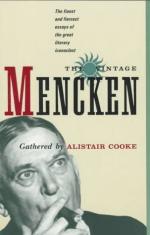|
This section contains 405 words (approx. 2 pages at 400 words per page) |

|
The Vintage Mencken Summary & Study Guide Description
The Vintage Mencken Summary & Study Guide includes comprehensive information and analysis to help you understand the book. This study guide contains the following sections:
This detailed literature summary also contains Topics for Discussion and a Free Quiz on The Vintage Mencken by H. L. Mencken.
The Vintage Mencken features a collection of newspaper articles and essays written by famous Baltimore journalist and intellectual H.L. Mencken. Topics range from nostalgic remembrances of the Baltimore of Mencken's childhood to intense and witty criticisms of art, modern-day life, religion, democracy, and political candidates.
Editor and friend to Mencken Alistair Cooke has selected forty-nine articles and essays as a "best of" collection. For this volume, Cooke has not included any of Mencken's considerable scholarship on the English language, but instead has included the biting, irreverent satire for which Mencken is most remembered. The volume begins with Mencken's remembrances of childhood, including growing up in Baltimore in the 1880s, painful experiences with the Y.M.C.A., and a few policemen stories when Mencken was a young beat journalist. Beyond this initial nostalgia, the order of articles becomes much less important, and there is no concern for actual chronology of articles. Mencken enjoyed a considerable amount of freedom in the subjects he chose to write about, and that is reflected in the wide range of subjects in this volume.
Art and artists is a common subject, and Mencken is always eager to deliver authoritative opinions. Theodore Dreiser has boring prose and a overly minute attention to detail, yet he manages to stir and touch one's soul in an uncommon manner. Modernist architecture is a blight on the world, and old-fashioned Eighteenth century English architecture is much preferred. Writing is a lonely profession, and most writers write due to vanity and a great need to be heard.
Politicians also come under Mencken's crosshairs. F.D.R. is considered a "weak candidate" when Mencken covers the Democratic Convention of 1932. Grover Cleveland was a man of integrity. Calvin Coolidge's lasting trait is that he slept a lot and didn't accomplish much, in keeping with Jeffersonian ideals of limited government. Mencken wonders why Lincoln is treated as such a saint when there are clear questions to be raised in his biography, and Mencken chides candidate Wallace for making an ass of himself during a press conference at the Progressive Party Convention of 1948.
Throughout, Mencken mercilessly attacks organized religion (especially the Southern evangelical movement), democracy, America's Puritan roots, low-class fools, and perceived quackery (like chiropractic medicine). Mencken is an unabashed aristocrat who yearns for aristocratic rule instead of a democratic rule. To rule by the majority is foolish, for the majority of people are fools.
Read more from the Study Guide
|
This section contains 405 words (approx. 2 pages at 400 words per page) |

|



